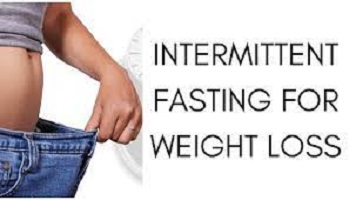Intermittent Fasting for Weight Loss
Intermittent Fasting for Weight Loss. Please Watch >>>>

- Intermittent Fasting By Age and Gender
- Intermittent Fasting ~ What Age Is Best for Man/Woman
- How to Lose Weight Fast and Safely – Best Guides
Table of Contents
Intermittent Fasting for Weight Loss ~ what is intermittent fasting?
Many diets concentrate on what to eat, but intermittent fasting focuses on when to eat. You only eat at certain times during intermittent fasting.
Fasting for a set number of hours per day or eating only one meal a couple of days per week can help your body burn fat.
Intermittent Fasting for Weight Loss ~ How Does It Work?
Fasting on alternate days, for whole days with a specific frequency per week, or during a set time frame are the most common methods.
- Alternate-day fasting – alternating between days with no food restriction and days with one meal that provides approximately 25% of daily calorie needs. For example, fasting is observed on Mondays, Wednesdays, and Fridays, with no food restrictions on alternate days.
- Whole-day fasting – 1-2 days per week of complete fasting or up to 25% of daily calorie needs, with no food restrictions on the remaining days. The 5:2 diet approach, for example, advocates no food restriction five days a week, followed by a 400-500 calorie diet the other two days.
- Time-restricted feeding – following a meal plan each day with a set fasting time. Example: Meals are served from 8 a.m. to 3 p.m., with fasting occurring during the remaining hours of the day. Intermittent fasting is a popular way for people to:
- Simplify their life
- Lose weight
- Improve their overall health and well-being, such as by minimizing the effects of aging
Is intermittent fasting suitable for you?
Fasting is generally safe for most healthy, well-nourished people, but it may not be appropriate for people with medical conditions.
For those who may be able to safely fast according to their doctor, the following tips are intended to assist them to make the experience as easy and successful as possible.
Intermittent Fasting for Weight Loss ~ How to Lose Weight
There are many different ways to lose weight and intermittent fasting is a strategy that has gained popularity in recent years.
It is an eating pattern that consists of frequent, short-term fasts – or periods of little or no food consumption.
Most people think of intermittent fasting as a weight loss strategy. Fasting for brief periods of time encourages people to consume fewer calories, which may result in weight loss over time
Intermittent fasting, on the other hand, may help modify risk factors for health conditions such as diabetes and cardiovascular disease by lowering cholesterol and blood sugar levels
This article will teach you everything there is to know about intermittent fasting and weight loss.
Choosing an Intermittent Fasting Plan
There are various methods of intermittent fasting and the most well-known are:
- the 16:8 method
- the 5:2 diet
- the Warrior diet
- Eat Stop Eat
- alternate-day fasting (ADF)
Here’s a breakdown of the pros and cons of each method to help you decide which one is best for you.
3 pros of intermittent fasting ~ Benefits of intermittent fasting
Researchers have already linked intermittent fasting to numerous health benefits and are continuing to investigate them.
Furthermore, for some people, intermittent fasting fits well into their long-term model of a healthy and sustainable diet.
If you’re wondering if intermittent fasting is right for you, here are a few advantages to consider.
- May help with weight loss and metabolic health.
- Can be a long-term lifestyle change
- Complements a nutritious, whole-foods diet
3 disadvantages of intermittent fasting
Intermittent fasting is one method for controlling your calorie intake and working toward better metabolic health.
Though the eating pattern can certainly be part of a healthy diet, it will most likely require some adjustment at first.
Furthermore, intermittent fasting is not for everyone.
Here are a few drawbacks to trying intermittent fasting for the first time.
- Might contradict your intuition
- You will most likely be hungry.
- The side effects may have an impact on your mood.
Should you try intermittent fasting to lose weight?
When attempting intermittent fasting, the quantity and quality of what you eat during your eating window are both important.
How can time-restricted eating assist with weight loss?
To begin, consider the difference between a fed state that promotes cellular growth and a fasted state that promotes cellular breakdown and repair.
Depending on the circumstances, either can be beneficial or harmful (consider how cellular growth builds lean muscle mass and also spawns cancer).
Many of our genes, particularly those that regulate metabolism (how we digest and use food energy), are turned on and off throughout the day in accordance with our innate circadian rhythms (our sleep/wake cycle).
Intermittent Fasting for Weight Loss ~ Questions Unanswered
- How frequently and for how long should one fast in order to see therapeutic benefits?
- Is this diet safe and beneficial for everyone (e.g., generally healthy people, people, higher risk individuals with chronic diseases, elderly)?
- What long-term effects does intermittent fasting have?
- Is there a risk of negatively influencing other family members’ dietary behaviors, particularly in children who see their parents avoiding food and skipping meals
Summary of Intermittent Fasting for Weight Loss
Intermittent fasting is a weight loss strategy that works for some but not all people.
It is not recommended for people who have had or are currently suffering from an eating disorder.
It may also be unsafe for children, people with underlying health conditions, and pregnant or breastfeeding mothers.
FAQs
Is intermittent fasting a reliable weight-loss strategy? Intermittent Fasting for Weight Loss
To date, the answer has remained ambiguous due to the poor quality of the evidence, which frequently includes very small sample sizes, short intervention periods, a variety of study designs (often lacking control groups), different fasting protocols, and participants of various shapes and sizes.
The majority of the data on intermittent fasting and its impact on weight loss comes from studies that use the time-restricted eating methodology of intermittent fasting.
A recent review of the evidence suggests that restricting you’re eating window may help you lose a few pounds.
How much weight can you lose in a month by fasting intermittently?
This is the amount of weight you can lose through intermittent fasting.
If you follow the fast correctly and ensure that it is aligned with your mind, body, and soul, you can expect to lose 2 to 6 kgs per month, with excellent inch loss and an increase in energy levels and brain function.
How much weight can you lose in a week by fasting intermittently?
Between 0.55 and 1.65 pounds
When it comes to weight loss, intermittent fasting may produce weight loss at a rate of 0.55 to 1.65 pounds (0.25-0.75 kg) per week (23).
People also had a 4-7% decrease in waist circumference, indicating that they lost belly fat.
Is intermittent fasting effective for weight loss?
The Advantages of Intermittent Fasting
This results in an increase in substances known as ketones. This combined with consuming fewer calories overall can result in weight loss.
According to research, alternate-day fasting is about as effective for weight loss as a typical low-calorie diet.
Can intermittent fasting help you lose belly fat?
Intermittent fasting has been shown to help reduce fat, particularly in the belly and trunk, due to its moderate energy restriction.
Can you drink coffee while fasting intermittently?
The short answer is that you can drink coffee while fasting intermittently.
However, there is one major caveat to this answer: while you can drink black coffee while intermittent fasting, coffee drinks with cream, sugar, or other forms of calories technically break your fast.
How soon will I see the benefits of intermittent fasting?
After the first week of intermittent fasting, you should notice less bloating and a tighter, slimmer midsection.
Some people will lose weight by week two, but don’t be discouraged if your scale hasn’t moved.
Continue for another 4-6 weeks, and you should notice a difference.
Is a 12-hour or 16-hour fast better?
People who fast more than 16 or 18 hours a day, for example, have a higher risk of gallstones, according to studies.
They are also more likely to require gallbladder removal surgery.
Longo explains that eating for 12 hours and then fasting for 12 hours is probably safe for most people.
How frequently should you practice 16 8 intermittent fastings?
You don’t eat anything for the next 16 hours, but you can drink water and other low-calorie beverages like plain coffee or tea.
You can repeat this cycle as many times as you want, from once or twice a week to every day, depending on your preferences.
Is sleeping considered fasting?
Sleeping counts as fasting during Intermittent Fasting.
You have completely fasted while sleeping because you are not consuming any food or drinks.
Are 12 hours considered intermittent fasting?
Twelve-hour fasting, also known as 12:12, is a type of intermittent fasting (IF) that many people try for weight loss and health benefits such as improved digestion, increased energy, and better sleep.
What am I allowed to drink while fasting?
In general, when fasting with time-restricted intermittent eating, you don’t eat anything and only drink low-calorie beverages like water or unsweetened coffee and tea without milk.
What can I drink while fasting intermittently?
During the fast, no food is permitted, but water, coffee, tea, and other non-caloric beverages are permitted.
During the fasting period, some forms of intermittent fasting allow for small amounts of low-calorie foods.
Taking supplements while fasting is generally permitted as long as they contain no calories.
How much weight will I lose if I fast for 16 hours per day?
How much weight can the 16:8 diet help you lose? According to a review of studies conducted by Sydney Medical School, if done correctly, there is a typical weight loss of seven to eleven pounds over a ten-week period
Is it possible to lose weight by fasting for 16 hours a day?
Fasting for 10-16 hours, according to some researchers, can cause the body to convert fat stores into energy, releasing ketones into the bloodstream.
This should promote weight loss. For beginners, this type of intermittent fasting plan may be a good option.
What happens to your body after a 16-hour fast?
If you don’t eat for 10-16 hours, your body will turn to its fat stores for energy, releasing fatty acids known as ketones into the bloodstream.
According to Mattson, this has been shown to protect memory and learning functionality, as well as slow disease processes in the brain
Will drinking lemon water break my fast?
The Untold Story of Lemon Water and Intermittent Fasting
Lemon water has almost no calories and no sugars, and it does not raise insulin levels, so it will not break your fast.
As a result, we can conclude that drinking lemon water while fasting is completely safe.
Why am I gaining weight while fasting intermittently?
You aren’t consuming enough protein.
If you don’t, you’ll feel hungry, which may lead to you eating more.
“The basic idea is that IF is a tool,” Langevin explained, “but if you’re not paying attention to calorie intake, or a balanced intake during your eating window, that can backfire,” resulting in weight gain.
Does lemon juice interfere with intermittent fasting?
When using the intermittent fasting method, plain lemon water with only lemon juice is also permitted.
The drink has almost no calories and does not interfere with your fast. When doing intermittent fasting, having one or two glasses of lemon drink can help you burn fat and curb your hunger.
Should I intermittent fast every day?
How Often Should You Use It? In other words – do you need to use Intermittent Fasting every day to reap the benefits?
In a nutshell yes and no
By implementing Intermittent Fasting even a couple of times per week, you are allowing your body to rest the gut and lower insulin levels in order to achieve your goal.
Is intermittent fasting effective without exercise?
Simply put, when people practice intermittent fasting without exercising, they lose weight, but a large portion of it comes from a muscle in the lean mass.
If they exercise, the loss of muscle mass is replaced by a loss of fat mass, which is a significant benefit.
Is a 14-hour fast sufficient?
According to functional practitioner B.J. Hardick, D.C., for many people, 14 to 18 hours of fasting per day is the ideal range, providing more significant weight loss benefits than a 12-hour fast while remaining attainable
What should I eat after a 16-hour fast?
Smoothies, soups, broths, and cooked vegetables and fruit are easier to digest.
After breaking your fast with these foods, it’s fine to move on to foods that may be a little more difficult to digests, such as complex carbohydrates, protein sources, and raw vegetables.
What is the intermittent fasting rule?
You only eat at certain times during intermittent fasting.
Fasting for a set number of hours per day or eating only one meal a couple of days per week can help your body burn fat.
Scientific evidence also points to some health benefits.
Who should not fast intermittently?
If you have higher caloric needs, you should avoid intermittent fasting.
Individuals who are underweight, struggling with weight gain, under the age of 18, pregnant, or breastfeeding should not try an intermittent fasting diet because they require adequate calories on a daily basis for proper development.
Intermittent fasting weight loss results
Alternate-day fasting resulted in weight loss of 3%-8% of body weight over three to eight weeks with results peaking at 12 weeks according to studies
According to the review, people who practice alternate-day fasting typically do not overeat or binge on feast days, resulting in mild to moderate weight loss.
16:8 fasting weight loss outcomes
How much weight can you lose in a month by fasting intermittently at 16:8?
If you follow the fast correctly and ensure that it is aligned with your mind, body, and soul, you can expect to lose 2 to 6 kgs per month, with excellent inch loss and an increase in energy levels and brain function.
Best weight loss intermittent fasting ~ what is the most effective weight loss intermittent fasting?
One of the most popular types of fasting for weight loss is the 16/8 intermittent fasting plan.
The plan restricts food and calorie-containing beverages to an 8-hour window per day.
It necessitates fasting for the remaining 16 hours of the day.
Diet plan for intermittent fasting 16/8
The practice of 16/8 intermittent fasting entails restricting your intake of foods and calorie-containing beverages to an 8-hour window each day.
You don’t eat anything for the next 16 hours, but you can drink water and other low-calorie beverages like plain coffee or tea.
Intermittent fasting results 1 week
When it comes to weight loss, intermittent fasting may produce weight loss at a rate of 0.55 to 1.65 pounds (0.25-0.75 kg) per week (23).
People also had a 4-7% decrease in waist circumference, indicating that they had lost belly fat.
Intermittent fasting schedule ~ what is a good schedule for intermittent fasting?
You can choose a daily approach that limits daily eating to one six- to eight-hour period per day.
For example, you could try 16/8 fasting, which involves eating for eight hours and fasting for sixteen.
Williams supports the daily routine, claiming that most people find it easy to stick to this pattern over time
Intermittent fasting for women ~ the Intermittent Fasting for Weight Loss
Daily 14-16 hour fasts, the 5:2 diet, or modified alternate-day fasting are the best types for women.
While intermittent fasting has been shown to be beneficial for heart health, diabetes, and weight loss, some evidence suggests that it may harm reproduction and blood sugar levels in some women.
Disclaimer:
No content on this site, regardless of date, should ever be used to replace direct medical advice from your doctor or other qualified clinicians.


